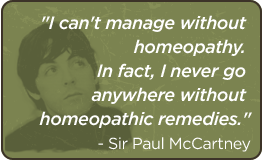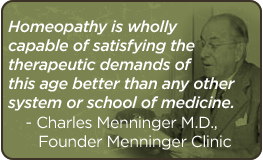FAQ
Here are a few questions I usually receive regarding homeopathy.
Click on a question below to see the answer.
Q. What is homeopathy? Is it the same as natural remedies like vitamins and herbs?
A. Homeopathy is a 200-year old system of natural medicine that was founded by the German physician, Samuel Hahnemann. It is a specific natural approach to health but does not include vitamins or herbs. If we consider all natural medicine or naturopathy, it includes many disciplines. For example, acupuncture, herbal medicine, chiropractic, massage therapy, nutritional therapy and homeopathy are all specific forms of natural medicine. In short, homeopathy is not a system of medicine that includes all natural medicine but is rather a specific system under the general umbrella of natural medicine. For a description of the basic principles of homeopathy please click on this New Client Info Form Download >>.
Q. You’re a psychologist, how and why did you become involved in homeopathy?
A. I first learned about homeopathy in 1987 while preparing for my national psychology examination. I found it interesting but it wasn’t until later, after speaking with an individual who had been successfully treated for Chronic Fatigue Syndrome with homeopathy, that I decided to explore this system more deeply. My motivation was partly based on helping a good friend who had been diagnosed with CFS a couple years earlier. My first, professional course began in 1989. What truly grabbed my interest was when I realized that homeopathic remedies could be used for emotional-psychological states and many remedies had a corresponding personality picture. I realized that this was truly a mind-body medicine that was well-suited to those of us with training in psychology and could be a far better solution to psychological problems then prescription drugs. It wasn’t long before my practice expanded to include individuals with a variety of physical issues as well.
Q. From what are homeopathic remedies made and how are they made? How is that different from herbal remedies?
A. Homeopathic remedies are primarily made from substances in the plant, mineral and animal kingdoms. Essentially, a mother tincture is made, similar to an herbal tincture, but this is where the similarity with herbal tinctures end. Homeopathic medicines then go through a process of dilution and potentization. Remedies are made into many types of potencies such as “X” potencies, which are diluted by a factor of 10 during each step. “C” potencies are diluted by a factor of 100 at each step so a 30c potency has been diluted 30 times, each time by a factor of 100. It is also potentized or succussed at each step and this is what gives it energy to stimulate our energetic system. In homeopathy, we call this system the vital force or vital energy. In Oriental medicine this system is called chi or qi. Many other systems have their own names for this energy including chiropractic and yoga. Some of this may sound far-fetched but there is clear evidence in support of these remedies. For information on research, please see the Resources page of this website and click “National Center for Homeopathy Research”. Lastly, there are other homeopathic potencies (i.e., M and LM potencies) that are typically only used by professional homeopaths.
Q. How long does it take for homeopathic remedies to work?
A. The short answer is, it depends. Typically, acute illnesses can respond to homeopathic remedies in a matter of minutes to a few days, depending on the condition. Chronic conditions may take several months to show a good degree of improvement to a few years for health to be fully restored. That said, when a person has been ill for many years, a condition cannot be expected to resolve quickly even with the best of homeopathic care. Moreover, each person is unique and their ability to respond to homeopathic remedies is also unique.





Follow Jeff On: